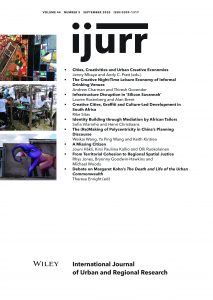Polycentricity is promoted as an ideal urban form to achieve sustainable and balanced development, and it has been widely adopted by planners in China, especially in large cities. However, the rhetoric about polycentricity has rarely been interrogated in planning research in terms of scales, contextuality, power and rationality. To fill this gap, we carried out a Foucauldian discourse analysis in our research to interpret the nature of polycentric practice in City Master Plans, using Tianjin as a case study. Through an analysis of how the discourse of polycentricity is being deployed in planning documents, we develop two principal arguments in this article. First, the conceptual substance of polycentricity evolved alongside the urban transition process in China, and its discursive practice involved multiple scales and spatial elements. Secondly, rather than being mere technocratic practice, the production and legitimation of distinct discourses of polycentricity is an articulation of multi‐scalar power involving various stakeholders, which is disguised and justified by the planning profession.
Details
Written by:
Weikai Wang, Ya Ping Wang & Keith Kintrea
Digital Object Identifier (DOI)
10.1111/1468-2427.12876
About DOI

